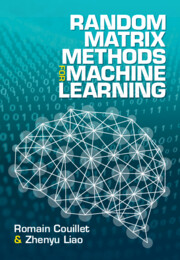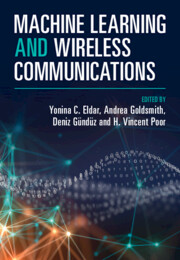Refine search
Actions for selected content:
2327 results in Pattern Recognition and Machine Learning
Index
-
- Book:
- Random Matrix Methods for Machine Learning
- Published online:
- 30 June 2022
- Print publication:
- 21 July 2022, pp 401-402
-
- Chapter
- Export citation
2 - Random Matrix Theory
-
- Book:
- Random Matrix Methods for Machine Learning
- Published online:
- 30 June 2022
- Print publication:
- 21 July 2022, pp 35-154
-
- Chapter
- Export citation
4 - Kernel Methods
-
- Book:
- Random Matrix Methods for Machine Learning
- Published online:
- 30 June 2022
- Print publication:
- 21 July 2022, pp 207-276
-
- Chapter
- Export citation
Preface
-
- Book:
- Random Matrix Methods for Machine Learning
- Published online:
- 30 June 2022
- Print publication:
- 21 July 2022, pp vii-viii
-
- Chapter
- Export citation
1 - Introduction
-
- Book:
- Random Matrix Methods for Machine Learning
- Published online:
- 30 June 2022
- Print publication:
- 21 July 2022, pp 1-34
-
- Chapter
- Export citation
Contents
-
- Book:
- Random Matrix Methods for Machine Learning
- Published online:
- 30 June 2022
- Print publication:
- 21 July 2022, pp v-vi
-
- Chapter
- Export citation
8 - Universality and Real Data
-
- Book:
- Random Matrix Methods for Machine Learning
- Published online:
- 30 June 2022
- Print publication:
- 21 July 2022, pp 364-377
-
- Chapter
- Export citation

Random Matrix Methods for Machine Learning
-
- Published online:
- 30 June 2022
- Print publication:
- 21 July 2022

Machine Learning and Wireless Communications
-
- Published online:
- 16 June 2022
- Print publication:
- 04 August 2022
6 - How to Choose a Graph
-
- Book:
- Introduction to Graph Signal Processing
- Published online:
- 09 May 2022
- Print publication:
- 09 June 2022, pp 181-201
-
- Chapter
- Export citation
Appendices
-
- Book:
- Control Systems and Reinforcement Learning
- Published online:
- 17 May 2022
- Print publication:
- 09 June 2022, pp 393-394
-
- Chapter
- Export citation
4 - Sampling
-
- Book:
- Introduction to Graph Signal Processing
- Published online:
- 09 May 2022
- Print publication:
- 09 June 2022, pp 120-148
-
- Chapter
- Export citation
4 - ODE Methods for Algorithm Design
- from Part I - Fundamentals without Noise
-
- Book:
- Control Systems and Reinforcement Learning
- Published online:
- 17 May 2022
- Print publication:
- 09 June 2022, pp 84-158
-
- Chapter
- Export citation
5 - Graph Signal Representations
-
- Book:
- Introduction to Graph Signal Processing
- Published online:
- 09 May 2022
- Print publication:
- 09 June 2022, pp 149-180
-
- Chapter
- Export citation
Dedication
-
- Book:
- Control Systems and Reinforcement Learning
- Published online:
- 17 May 2022
- Print publication:
- 09 June 2022, pp v-vi
-
- Chapter
- Export citation
8 - Stochastic Approximation
- from Part II - Reinforcement Learning and Stochastic Control
-
- Book:
- Control Systems and Reinforcement Learning
- Published online:
- 17 May 2022
- Print publication:
- 09 June 2022, pp 280-317
-
- Chapter
- Export citation
5 - Value Function Approximations
- from Part I - Fundamentals without Noise
-
- Book:
- Control Systems and Reinforcement Learning
- Published online:
- 17 May 2022
- Print publication:
- 09 June 2022, pp 159-202
-
- Chapter
- Export citation
6 - Markov Chains
- from Part II - Reinforcement Learning and Stochastic Control
-
- Book:
- Control Systems and Reinforcement Learning
- Published online:
- 17 May 2022
- Print publication:
- 09 June 2022, pp 205-243
-
- Chapter
- Export citation
Index
-
- Book:
- Control Systems and Reinforcement Learning
- Published online:
- 17 May 2022
- Print publication:
- 09 June 2022, pp 433-436
-
- Chapter
- Export citation
3 - Graph Signal Frequency – Spectral Graph Theory
-
- Book:
- Introduction to Graph Signal Processing
- Published online:
- 09 May 2022
- Print publication:
- 09 June 2022, pp 75-119
-
- Chapter
- Export citation
